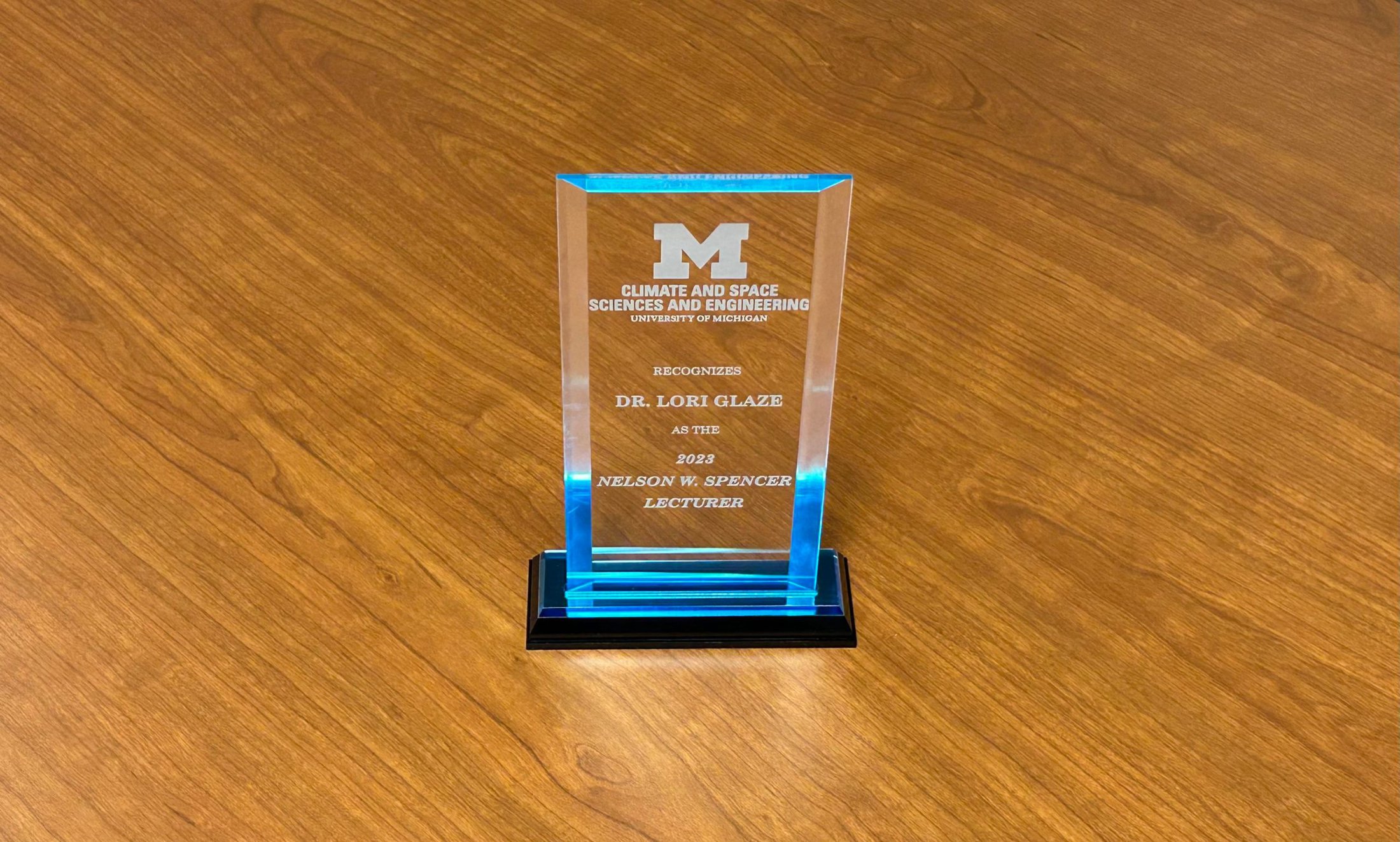
Annual Spencer Lecture Features NASA Director of Planetary Science Lori Glaze
On March 9, 2023, the Nelson W. Spencer Lecture will feature Dr. Lori Glaze, the director of NASA’s Science Mission Directorate’s Planetary Science Division.

On March 9, 2023, the Nelson W. Spencer Lecture will feature Dr. Lori Glaze, the director of NASA’s Science Mission Directorate’s Planetary Science Division.
In March, the 2023 Nelson W. Spencer Lecture will feature Dr. Lori Glaze, the director of NASA’s Science Mission Directorate’s Planetary Science Division. The lecture will be offered as part of the U-M Climate and Space Seminar Series at 3:30pm Eastern on Thursday, March 9.
Dr. Nelson W. Spencer became the director of the U-M Space Physics Research Laboratory in 1948 and remained its guiding force until 1960. During his tenure, SPRL established itself as a prominent leader in the exploration of the Earth’s upper atmosphere. Dr. Spencer believed in the importance of including science goals in all space flight missions, and was a pioneer in America’s space science program. Each year, a special guest speaker is invited to the Climate and Space Sciences and Engineering Department to present a lecture in Dr. Spencer’s honor.
Dr. Lori Glaze works as the director of NASA’s Science Mission Directorate’s Planetary Science Division. Within NASA’s Science Mission Directorate, the Planetary Science Division focuses on space flight missions and scientific research that address fundamental questions of solar system formation and evolution, including understanding planetary environments that can (or could have in the past) support life.
Prior to headquarters, Dr. Glaze served as the chief of the Planetary Geology, Geophysics and Geochemistry Laboratory at Goddard Space Flight Center in Greenbelt, Maryland, and as the Deputy Director of Goddard’s Solar System Exploration Division.
Dr. Glaze’s research interests include physical processes in terrestrial and planetary volcanology, atmospheric transport and diffusion processes, and geologic mass movements. Her work focuses on data analysis and theoretical modeling of surface processes on all the terrestrial solar system bodies, particularly the Earth, Venus, Mars, Moon, and Io. She develops statistical, analytical, and data management methods in support of physical process modeling and develops applications of diverse sets of terrestrial and planetary remote sensing data.
Dr. Glaze was a member of the Inner Planets Panel during the most recent Planetary Science Decadal Survey, and has had a role on the Executive Committee of NASA’s Venus Exploration Analysis Group (VEXAG) for several years, serving as the group’s Chair from 2013 – 2017. Dr. Glaze was a member of the Planetary Science Subcommittee from 2011 to 2013.
She has been involved with many NASA-sponsored Venus mission concept formulation studies, including as a member of the Venus Flagship Science and Technology Definition Team, as Science Champion for the Venus Mobile Explorer, and Co-Science Champion for the Venus Intrepid Tessera Lander. Until her move to headquarters, she also was the Principal Investigator of the Deep Atmosphere Investigation of Noble gases, Chemistry, and Imaging (DAVINCI).
Dr. Glaze will give a talk titled “Exploring the Solar System with NASA’s Planetary Science Division.” In her presentation, Glaze will discuss several missions in the PSD portfolio, which span the full breadth of the Solar System—from NASA contributions to the Europe/Japan-led BepiColombo mission heading to Mercury, all the way to New Horizons past Pluto in the Kuiper Belt. Glaze will cover some recent scientific highlights stemming from missions such as InSight, Mars2020/Perseverance, and DART—the first test of a planetary defense technique. She will also talk about some upcoming missions, including the Psyche mission to a metal asteroid, Europa Clipper, the bold Mars Sample Return endeavor, and NASA’s return to the Moon, as well as some of her career highlights.
Dr. Glaze was born in Texas, where she graduated from the University of Texas, Arlington with a B.A. and M.S. in Physics. She received a Ph.D. in Environmental Science from Lancaster University in the United Kingdom. She has also previously worked at the Jet Propulsion Laboratory and at Proxemy Research as Vice President and Senior Research Scientist.